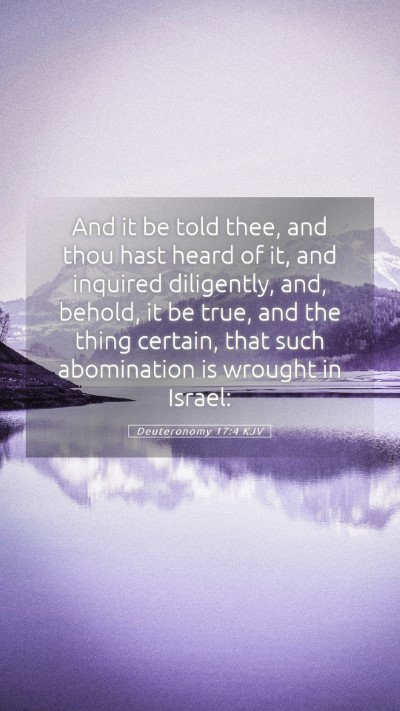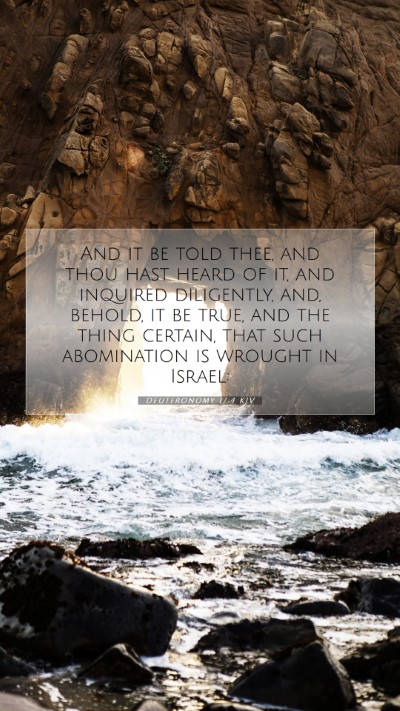Understanding Deuteronomy 17:4
Bible Verse: “And it be told thee, and thou hast heard of it, and inquired diligently, and behold, it be true, and the thing certain, that such abomination is wrought in Israel…” (Deuteronomy 17:4)
Overview
This verse is part of the Mosaic Law, addressing Israel's accountability in relation to apostasy and idolatry. The verse outlines the process of investigating alleged idolatrous acts within the community before taking further action.
Interpretation from Public Domain Commentaries
-
Matthew Henry:
Henry emphasizes the gravity of idolatry in Israel and the importance of thorough investigation before any penalties are applied. He notes that the Israelite community must approach such serious accusations with diligence and respect for truth, reflecting the sanctity of their covenant with God.
-
Albert Barnes:
Barnes highlights the legal principles presented in this verse. The necessity for a diligent inquiry underscores the importance of justice, ensuring that no one is wrongly accused. This emphasizes God’s desire for order and righteousness in society.
-
Adam Clarke:
Clarke points out that the methods of investigation prescribed indicate that God demands integrity and thoroughness in upholding His commandments. He reminds readers of the seriousness of false worship and the repercussions associated with leading others astray.
Key Themes
- Justice and Diligence: This verse portrays God's call for justice through careful examination of accusations.
- The Seriousness of Idolatry: Idolatry is a grave sin against God, requiring the utmost attention to address it.
- Covenantal Responsibility: As members of a covenant with God, the people of Israel are tasked with upholding His laws and maintaining communal purity.
Application of the Verse
Incorporating the insights from this verse into everyday life involves understanding the importance of thorough investigation before making judgments. This extends to our interactions with others, ensuring we approach every situation with fairness and care. Moreover, the commitment to avoid idolatry translates into a call for believers today to recognize and eliminate false worship in various forms—be it materialism, selfish ambitions, or misguided priorities.
Related Scripture Cross References
- Exodus 20:3-5: The foundational commandments against idolatry.
- Leviticus 20:2-5: The consequences for idolatrous practices among the community.
- Matthew 18:16: Jesus’ instruction on confronting sin in the community.
- 1 Timothy 5:19: Guidelines for handling accusations against elders.
- Deuteronomy 13:14: The process for dealing with a false prophet or idolater.
Conclusion
Deuteronomy 17:4 serves as a reminder of the need for thorough investigation and judgement in regard to serious sins like idolatry. The teachings encapsulated in this verse reflect timeless biblical truths about justice, accountability, and the sanctity of our covenant with God. This understanding not only helps in comprehending Scripture better but also aids in applying these divine principles in our individual lives and communal worship settings.


